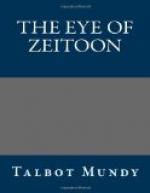“They call her Maga Jhaere,” said I. “The attaman’s name is Jhaere. Don’t you suppose he’s her father?”
“If he were her father he would have no fear,” the Rajput answered. “All gipsies are alike. Their women will dance the nautch, and promise unchastity as if that were a little matter. But when it comes to performance of promises the gitana* is true to the Rom.** It is because she is no gipsy that they follow her now to watch. And it is because men say that Americans are Mormons and polygamous, and very swift in the use of revolvers, that all follow instead of one or two!”
-------------- * Gitana, gipsy young woman. ** Rom—Gipsy husband, or family man. --------------
“Go down then, and make sure they don’t murder him!” commanded Monty, and Rustum Khan turned to obey with rather ill grace. He contrived to convey by his manner that he would do anything for Monty, even to the extent of saving the life of a man he disliked. At the moment when he turned there came the sound of a troop of horses galloping toward us.
“I will first see who comes,” he said.
“The blood of Yerkes sahib on your head, Rustum Khan!” Monty answered. At that he went below.
But neither were we destined to remain up there very long. We heard colossal thumping in the kahveh beneath us and presently the Rajput’s head reappeared through the opening in the roof.
“The fools are barricading the door,” he shouted. “They make sure that an enemy outside could burn us inside without hindrance!”
At that Kagig came along the roof to our corner and looked into Monty’s eyes. Fred and I stood between the two of them and the parapet, because for the first few seconds we were not sure the Armenian did not mean murder. His eyes glittered, and his teeth gleamed. It was not possible to guess whether or not the hand under his goat-skin coat clutched a weapon.
“It is now that you Eenglis sportmen shall endure a test!” he remarked.
Exactly as in the Yeni Khan in Tarsus when we first met him there was a moment now of intense repulsion, entirely unaccountable, succeeded instantly by a wave of sympathy. I laughed aloud, remembering how strange dogs meeting in the street to smell each other are swept by unexplainable antipathies and equally swift comradeship. He thought I laughed at him.
“Neye geldin?” he growled in Turkish. “Wherefore didst thou come? To cackle like a barren hen that sees another laying? Nichevo,” he added, turning his back on me. And that was insolence in Russian, meaning that nobody and nothing could possibly be of less importance. He seemed to keep a separate language for each set of thoughts. “Let us go below. Let us stop these fools from making too much trouble,” he added in English. “One man ought to stay on the roof. One ought to be sufficient.”




